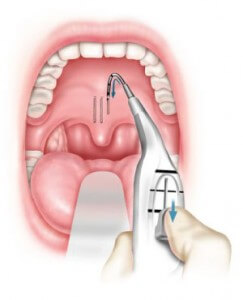Obstructive sleep apnea
Sleep is a necessity, and chances are you’re not getting enough if you or your partner snores. While snoring, which is essentially noisy breathing during sleep, can be disruptive, it can also be a sign of something more troublesome.
Obstructive sleep apnea is a potentially serious sleep disorder in which breathing repeatedly stops and starts. If left untreated, over time, this can result in including high blood pressure, stroke, an enlarged heart, heart failure, diabetes, and heart attack. Someone with sleep apnea will often feel tired, even after a full night’s sleep.
Other symptoms may include:
- Snoring
- Daytime sleepiness or fatigue
- Restlessness during sleep, frequent nighttime awakenings
- Sudden awakenings with a sensation of gasping or choking.
- Dry mouth or sore throat upon awakening
- Cognitive impairment, such as trouble concentrating, forgetfulness or irritability
- Mood disturbances (depression or anxiety)
- Night sweats
- Frequent nighttime urination
- Sexual dysfunction
- Headaches
Obstructive sleep apnea is caused by a blockage of the airway, usually when the soft tissue in the rear of the throat collapses during sleep. This typically occurs in repetitive episodes throughout the night. During each episode, the diaphragm and chest muscles work harder as the pressure increases to open the airway. Breathing usually resumes with a loud gasp or body jerk.
Diagnosing sleep apnea involves undergoing a sleep study. During this test, you’re hooked up to equipment that monitors your heart, lung, and brain activity, breathing patterns, arm and leg movements, and blood oxygen levels while you sleep
Treatment of sleep apnea
Non-invasive treatment
The most common treatment of obstructive sleep apnea is the use of a CPAP (continuous positive airway pressure) machine. The machine pushes a steady stream of air through a mask that you wear while you sleep and keeps your airway open.
Surgical treatment

The Pillar Procedure is an FDA-approved, minimally invasive treatment for snoring and mild to moderate sleep apnea. During the procedure, small woven implants are placed in the soft palate, stiffening the palate and reducing vibration that can cause snoring.
According to studies, most patients report a noticeable, lasting reduction in sleep apnea and snoring. Sleep apnea was reduced in up to 81% of the patients; for patients suffering from disruptive snoring, bed partner satisfaction was as high as 100%.
The procedure can be performed in a single, short office visit, and because it involves no surgical removal of tissue, it’s relatively painless.
More than 45,000 people worldwide have been treated with the minimally invasive Pillar Procedure and have experienced a significant reduction in snoring and mild to moderate sleep apnea.
Get started
Start feeling better.
Request an appointment today.
[wpforms id=”3624″ title=”false”]
If you prefer, give us a call.
Call 763-233-5755We can help you.
The physicians and clinical staff at Oakdale Ear, Nose & Throat Clinic are committed to your health and well-being. Allergies, sinus and nasal disorders, hearing loss — and many other ENT conditions — can disrupt and complicate life. That’s why we seek out the most innovative diagnostic testing and treatment options that bring real results, improving the quality of life for our patients.